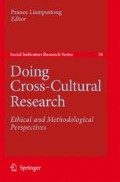Abstract
Evidence suggests that in research studies involving minority language users, rigour is enhanced when researchers share a common language and culture with research participants and thus are considered to be “insiders”. However, it is clear that the use of “insiders” is not always possible and where the researchers and the researched do not share a common culture and language, measures can be taken to ensure that the research is rigorous. Furthermore, cultural and linguistic concordance does not in itself guarantee rigour; researchers must also demonstrate that their approach stands up to judgement against criteria that are congruent with the relevant research paradigm.
In this chapter, we consider best practice in research studies involving more than one language when the researchers are either insiders or outsiders. We draw on examples from published literature and from our research experiences as insiders and outsiders to examine approaches for enhancing rigour when conducting qualitative research. Attention is given to cultural issues, which we argue are inextricably linked to language, and therefore require cultural sensitivity on the part of the researcher in order to effectively capture and interpret data. We also examine sampling and recruitment, in which we demonstrate the measures that can be taken to facilitate the recruitment of participants with different language backgrounds. We give some consideration to data collection and identify strategies that can be adopted to gain rich data from participants where researchers either share or do not share the same language as the researched. Translation and interpretation are both identified as approaches that can facilitate rigorous cross-cultural research if addressed appropriately. The process of transcription, which is rarely addressed in the literature, is also examined and suggestions are given about how this can be tackled when operating in more than one language. Finally, we consider data analysis and offer suggestions for best practice when analysing data collected in two or more languages.
Access this chapter
Tax calculation will be finalised at checkout
Purchases are for personal use only
Preview
Unable to display preview. Download preview PDF.
ReferencesReferences
Alibhai-Brown, Y. (2000). Who do we think we are? Imagining the New Britain. London: Penguin.
Bassnet, S. (2004). Translation studies . London: Routledge.
Birbili, M. (2000). Translating from one language to another. Social Research Update, 31. http:// sru.soc.surrey.ac.uk/SRU31.html (Accessed 20/2/2008).
Charmaz, K. (2006). Constructing grounded theory: A practical guide to thorough qualitative analysis . London: Sage Publications.
Chui, L., & Knight, D. (1999). How useful are focus groups for obtaining the views of minority groups? In R. Barbour & J. Kitzinger (Eds.), Developing focus group research: Politics, theory and practice (pp. 99 - 112). London: Sage Publications.
Culley, L., Hudson, N., & Rapport, F. (2007). Using focus groups with minority ethnic communi-ties: Researching infertility in British South Asian communities. Qualitative Health Research, 17(1), 102-112.
Denzin, N. & Lincoln, Y. (2008) (Eds.). Collecting and interpreting qualitative materials, 3rd edition. Thousand Oaks, CA: Sage publications.
Dunkley, M., Hughes, R., Addington-Hall, J, & Higginson, I. (2003). Translating clinical tools in nursing practice. Journal of Advanced Nursing. 44(4), 420-426.
Edwards, R. (1998). A critical examination of the use of interpreters in the qualitative research process. Journal of Ethnic and Migration Studies, 24, 197-208.
Esposito, N. (2001). From meaning to meaning: The influence of translation techniques on non-English focus group research. Qualitative Health Research 11(4):568-579.
Green, J., & Thorogood, N. (2004). Qualitative methods for health research . London: Sage Publications.
Hennink, M. (2007). International focus group research: A handbook for the health and social sciences. Cambridge, UK: Cambridge University Press.
Larkin, P. (2007). Multilingual translation issues in qualitative research: Reflections on a meta-phorical process. Qualitative Health Research, 17(4), 468-476.
Marin, G., & Marin, B. (1991). Research with Hispanic populations. Newbury Park, CA: Sage Publications.
Mahony, P., & Zmroczek, C. (1997). Class matters: Working class women’s perspectives on social class . London: Taylor & Francis.
Maynard-Tucker, G. (2000). Conducting focus groups in developing countries: Skill training for bi-lingual facilitators. Qualitative Health Research, 10(3), 396-410.
Simon, S. (1996). Gender in translation: Cultural identity and the politics of transmission . London: Routledge.
Temple, B. (1997). Watch your tongue: Issues in translation and cross-cultural research. Sociology, 31(3), 607-618.
Temple, B. (2002). Crossed wires: Interpreters, translators and bilingual workers in cross-language research. Qualitative Health Research, 12(6), 844-854.
Temple, B., & Edwards R. (2002). Interpreters/translators and cross-language research: Reflexivity and border crossing. I nternational Journal of Qualitative Methods, 1 (2). http://ejournals. library.ualberta.ca/index.php/IJQM/issue/archive (Accessed 20/2/2007).
Temple, B., & Young, A. (2004). Qualitative research and translation dilemmas. Qualitative Research, 4, 161-178.
Twinn, S. (1997). An exploratory study examining the influence of translation on the validity and reliability of qualitative data in nursing research. Journal of Advanced Nursing, 26, 418-423.
Winchatz, M. (2006). Fieldworker or Foreigner? Ethnographic interviewing in non-native lan-guages. Field Methods, 18(1), 83-97.
Winslow, W., Honein, G., & Elzubeir, M. (2002). Seeking Emirati women’ s voices: The use of focus groups with an Arab population. Qualitative Health Research, 12(4), 566-575.
Author information
Authors and Affiliations
Editor information
Editors and Affiliations
Rights and permissions
Copyright information
© 2008 Springer Science + Business Media B.V
About this chapter
Cite this chapter
Irvine, F., Roberts, G., Bradbury-Jones, C. (2008). The Researcher as Insider Versus the Researcher as Outsider: Enhancing Rigour Through Language and Cultural Sensitivity. In: Liamputtong, P. (eds) Doing Cross-Cultural Research. Social Indicators Research Series, vol 34. Springer, Dordrecht. https://doi.org/10.1007/978-1-4020-8567-3_3
Download citation
DOI: https://doi.org/10.1007/978-1-4020-8567-3_3
Publisher Name: Springer, Dordrecht
Print ISBN: 978-1-4020-8566-6
Online ISBN: 978-1-4020-8567-3
eBook Packages: Humanities, Social Sciences and LawSocial Sciences (R0)

